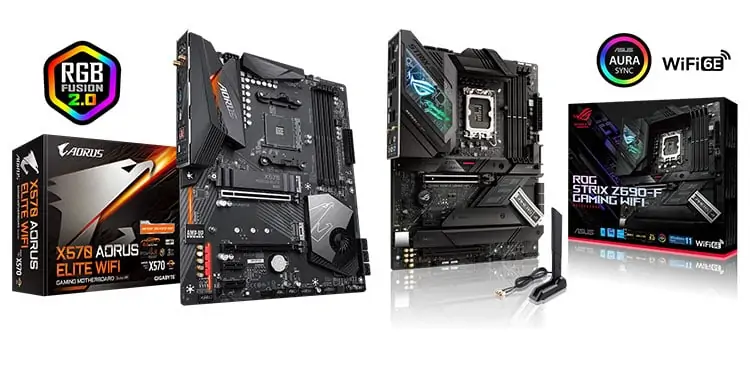Looking for an ATX motherboard in 2022 can be quite a challenge, and not only because of the sheer number of brands out there. The truth is, when you search by form factor rather than chipset or other features, your potential options just increase tenfold.
So, in this article, I will help you narrow down to ten of the best ones for both AMD and Intel. Whether you’re looking for a premium Z690 motherboard for your 12900K or a budget-friendly B550 one for your 5600x, I’ve got some great options for you.
Best ATX Motherboards in 2022 – Overview
[table id=396 /]
Before You Buy
Before you go ahead and commit to buying an ATX motherboard, it’s beneficial to learn more about what it is. Developed in 1995 by Intel, ATX is a popular and globally-accepted motherboard and PSU configuration specification.
The form factor you go for, especially with your motherboard, is very important. It determines the general layout, physical size, and feature placement on it.
While, yes, it’s undoubtedly the most popular of all the major motherboard form factors, it’s important to know more about the other options too.
Some of the most popular form factors of motherboards, from largest to smallest, are:
- eATX (12 x 13 in)
- ATX (12 x 9.6 in)
- Micro ATX (9.6 x 9.6 in)
- Mini-ITX (6.7 x 6.7 in)
These have been designed for expanded or cut-down feature sets to fit different case sizes like a full-tower case, mid-tower, mini-tower, and mini-ITX.
Although it’s helpful to keep in mind these special options, chances are that if you’re a general user you’ll be happy with ATX.
So, without further ado, let’s dive into the best ATX motherboards list…
Best ATX Motherboards in 2022
Gigabyte X570 Aorus Elite WiFi – Best AMD ATX Motherboard
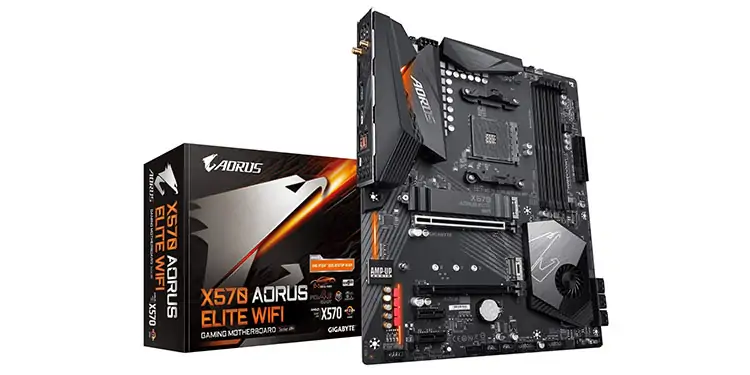
Key Specifications
- CPU Socket: AM4
- RAM Capacity: 128GB DDR4 (4 Slots up to 4733MHz)
- Networking and Connectivity: Intel WiFi 6, 1G Ethernet Port, and Bluetooth 4.2
- RGB Support: Yes (Aorus RGB Fusion 2.0)
- Audio: Realtek ALC1200
- Form Factor: ATX (12 x 9.6 inches)
Before we get into optimal motherboards for different categories, let’s just pick out the best overall one. For this, I have to recommend the Gigabyte X570 Aorus Elite WiFi. It’s great in terms of cooling capacity, port availability, and design. Let’s learn more about it.
First comes the VRM: it has a 12+2 phase design which is good enough for an ATX motherboard. You also get a chipset fan which helps out a bit in extreme situations like overclocking.
One cool feature in this board is the Q-Flash Plus button, which will allow you to update it with the Ryzen 5000 BIOS without needing a last-gen CPU. This could be useful for first-time PC builders who don’t have a bunch of secondary parts lying around the house.
Granted, at this point in its lifecycle, the chances of you getting one without the updated BIOS out-of-the-box are pretty slim, but it’s a handy feature to have nonetheless. When it comes to I/O, you get all the necessary connectivity and storage ports which are protected with an aluminum plate for extra durability.
On top of that, some other exciting features to look out for are the dual NVMe PCIe M.2 slots with thermal guards and the subtle RGB lighting on the edges of the board.
Overall, the Gigabyte X570 Aorus Elite WiFi is a great AM4 motherboard. It’s perfect for any gaming PC or video editing builds, not only in terms of features but also design. So, consider this one if you’re looking for an X570 motherboard for your PC build.
- Q-Flash Plus button is user-friendly for beginners
- Subtle and premium addition of RGB
- Thermal guards for M.2 drives
- Only last generation version of Bluetooth available
MSI MPG X570 Gaming Plus – Best ATX X570 Motherboard for Build Quality
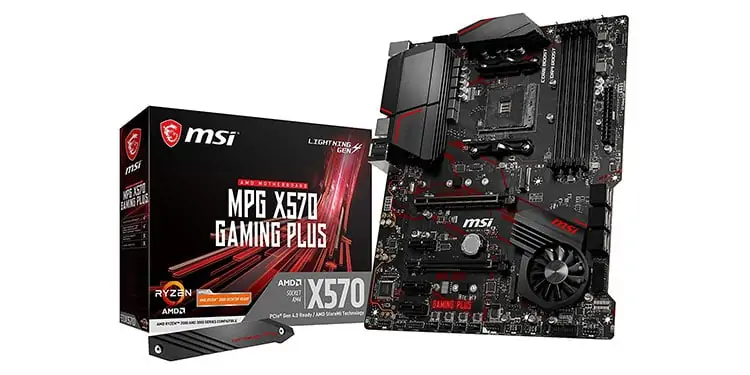
Key Specifications
- CPU Socket: AM4
- RAM Capacity: 128GB DDR4 (4 Slots up to 4400MHz)
- Networking and Connectivity: Gigabit Ethernet Port
- RGB Support: Yes (ASUS Mystic Light)
- Audio: Realtek ALC1220
- Form Factor: ATX (12 x 9.6 inches)
If you’re looking for an X570 motherboard with the great build quality, look no further than the MSI MPG X570 Gaming Plus. With this motherboard, you get an AMD AM4 socket which gives you access to 2nd and 3rd Gen Ryzen CPUs as well as the latest ones.
For all the storage-hungry users out there, it has two M.2 SSD slots and six SATA III ports, all protected with an aluminum Frozr heatsink along with double ball bearings for an easy installation and removal experience.
If you’re a high-end user and use applications that eat up a lot of memory, like video editing or game design, then I have some good news for you. This motherboard supports a maximum of 128GB of DDR4 RAM with speeds of up to 4400MHz.
For audio, you get a Realtek ALC1220 codec with this board combined with audio boost software by MSI. This leads to high-quality and clear audio which means you can chat with your teammates in FPS games without any hassle and get better clarity overall.
When it comes to I/O, you get all the expected ports. However, what sets the MPG X570 Gaming Plus apart from the rest is that it has pre-installed I/O grounded shielding. This not only gives it better durability but also protects it from damaging discharges from your environment.
All in all, the MSI MPG X570 Gaming Plus is a pretty awesome AM4 X570 motherboard. If you can overlook the lack of WiFi support and the mediocre 8+2 VRM design, then this could be a solid option to pair with any compatible AMD Ryzen CPU!
- Support for high-speed DDR4 Dual Channel memory
- Immersive audio
- Onboard chipset fan and heatsinks for SSDs
- Lacks onboard WiFi support
MSI Meg X570 Unify – Best ATX X570 Motherboard for Overclocking
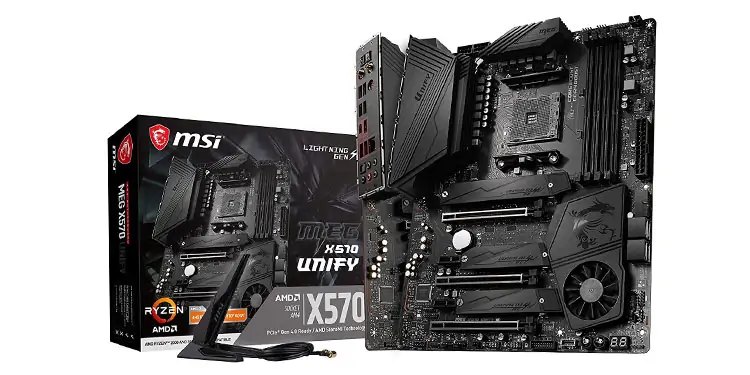
Key Specifications
- CPU Socket: AM4
- RAM Capacity: 128GB DDR4 (4 Slots up to 4600MHz)
- Networking and Connectivity: Intel WiFi 6 and 2.5G Ethernet Port, Bluetooth 5.2
- RGB Support: NA
- Audio: Realtek ALC1220
- Form Factor: ATX (12 x 9.6 inches)
If you’re looking to overclock your Ryzen 5000 CPU, like your 5800x or 5950x, you need a capable motherboard. One with hefty VRMs, powerful cooling, and great build quality. With that in mind, I recommend the MSI Meg X570 Unify.
First, let’s discuss power delivery. The Meg X570 Unify uses a 12+2 VRM phase design. While this isn’t significantly better than the previous pick, it’s still pretty capable of handling any crazy overclocks you throw at it. It’s also helped out by the heavy-duty chipset fan which can boost cooling in high-temperature use cases.
Another feature to note about the Meg X570 Unify is the lack of RGB lighting. I know, this might be a huge deal-breaker for most users. However, there’s a community of gamers who especially prefer the no-RGB and blacked-out look. So, if you’re a part of that group, you might want to consider this one.
This motherboard isn’t easy to damage or break either. It’s designed to be tough and solid and has a strong chassis. Plus, three of the M.2 slots are protected by aluminum covers along with thermal pads to control heat when under high load.
When it comes to I/O, you get over seven USB ports as well as a USB Type-C port and a CMOS and BIOS flash button. Fortunately, it is also protected with an aluminum shield just like the M.2 slots, which contributes to the overall durability of the motherboard.
So, with hefty VRMs, powerful cooling, and great build quality, the MSI Meg X570 Unify is a great motherboard if you want to overclock your Ryzen CPU, and a superb choice in general as well.
- Tough and sturdy build quality
- Useful BIOS flash button
- Lacks any distracting RGB lights
- Slightly overpriced
MSI MAG B550 Tomahawk – Best ATX B550 Motherboard for Value
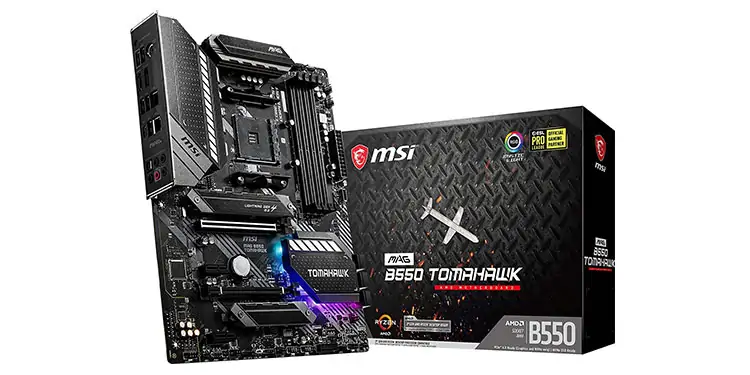
Key Specifications
- CPU Socket: AM4
- RAM Capacity: 128GB DDR4 (4 Slots up to 5100MHz)
- Networking and Connectivity: 2.5G LAN and 1G LAN
- RGB Support: Yes (MSI Mystic Light)
- Audio: Realtek ALC1200 / ALC1220P
- Form Factor: ATX (12 x 9.6 inches)
The B550 AM4 chipset is the perfect option for those who want a budget-friendly motherboard for their Ryzen CPU. While it’s unsuitable for high-end CPUs like the 5900x or 5950x, it’s right for mid-range ones like 5600x or 5800x. Within that lineup of motherboards, you get plenty of options, but the one that manages to provide the most value is the MSI Mag B550 Tomahawk.
Let’s discuss the best feature of this motherboard first, the 12+2+1 phase power delivery system. It enables you to do some overclocking and is fairly rare at this price point. In addition to that, there’s also dual-channel DDR4 RAM with speeds up to 5100MHz. Put two and two together, and you have a beast of a PC!
The build is comparatively great too, considering the price. While, yes, most of it is made of plastic, you also get aluminum covers with thermal pads for two of the M.2 SSD slots. The design is also fairly premium with a monochrome finish and subtle RGB lighting.
Overall, the MSI Mag B550 Tomahawk is a value-packed B550 board. If you’re building your first gaming PC and want to keep it budget-friendly, then this could be a great motherboard to go for. It has all the essentials you need but also some premium features that are nice to have.
- Reasonably priced
- Strong VRM phase design
- Premium build quality
- Lacks both WiFi and Bluetooth connectivity
ASRock B550 PRO4 – Best B550 ATX Motherboard
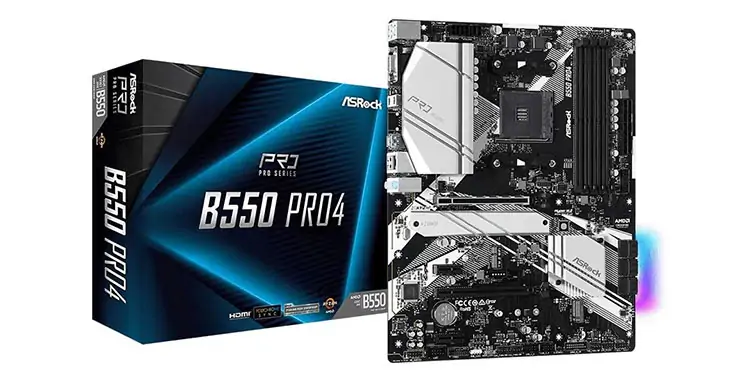
Key Specifications
- CPU Socket: AM4
- RAM Capacity: 128GB DDR4 (4 Slots up to 4733MHz)
- Networking and Connectivity: 1G Ethernet Port
- RGB Support: Yes (ASRock Polychrome Sync)
- Audio: Realtek ALC1200
- Form Factor: ATX (12 x 9.6 inches)
If you love the MSI Mag B550 Tomahawk but want a motherboard with white and silver accents, the ASRock B550 PRO4 could be a viable alternative. While it’s not as good as the Tomahawk in some aspects, it’s still a great AM4 B550 motherboard overall.
It has an 8-phase power design, which is definitely a letdown. On top of that, it doesn’t come with an onboard chipset fan either. However, using any of the multiple case fan ports and an extra CPU fan header, you can mount a fan on the top of the case for some extra cooling without significantly higher noise output.
When it comes to RAM, you can attach over four sticks totaling a maximum of 128GB with speeds of up to 4733MHz when overclocked. With the user-friendly ASRock UEFI that should be fairly easy to do as well.
In terms of connectivity, the B550 PRO4 does only has a 1G ethernet port. Bluetooth and WiFi are unavailable out of the box, but you do get a dedicated M.2 WiFi slot though. You can use it to attach a WiFi chip and get access that way, but it’s still an extra hassle.
Of course, you also get the famous ASRock Polychrome Sync software with the B550 PRO4, which provides you with over 16.8 million colors with multiple effects. Plus, there is also an RGB lighting zone on the motherboard itself on the lower right side.
As I said before, if you’re looking for a budget-friendly AM4 B550 motherboard for your white/silver PC build, the ASRock B550 PRO4 can be a great option. So, definitely keep this one in mind!
- High-quality onboard audio
- Multiple fan headers and water pump headers
- Dual M.2 slots
- Only an 8-phase VRM
ASUS ROG Strix Z690-F – Best Intel ATX Motherboard Overall
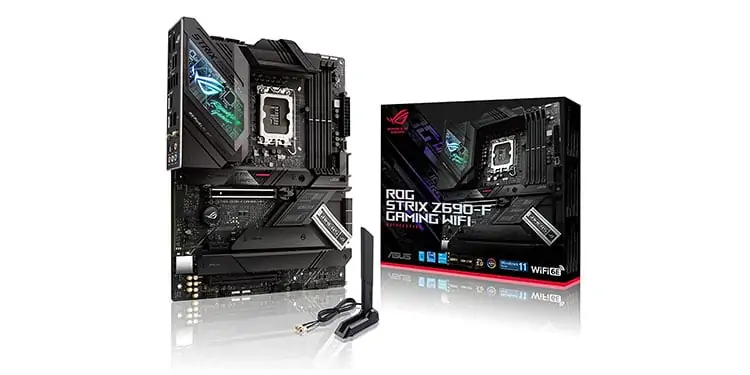
Key Specifications
- CPU Socket: LGA 1700
- RAM Capacity: 128GB DDR5 (4 Slots up to 6400MHz)
- Networking and Connectivity: Intel WiFi 6E, 2.5GBPS Ethernet Port, and Bluetooth 5.2
- RGB Support: Yes (ASUS Aura Sync)
- Audio: Savitech SV3H712 amplifier
- Form Factor: ATX (12 x 9.6 inches)
ASUS ROG Strix Z690-F is perhaps one of the best examples of the latest generation Z690 motherboards. It has all the features that we’ve come to expect with this new lineup of CPUs, but some extras on top as well.
Of course, being a Z690 motherboard it has the LGA 1700 chipset which makes it compatible with the 12th-Gen Alder Lake, Celeron, and Pentium Gold CPUs. But, can it handle them without overheating? Well, with its 16+1 phase VRM, it sure can!
A CPU is nothing without fast RAM, and the ROG Strix Z690-F doesn’t disappoint in that regard too. Like most of the boards on this list, it has four DIMM slots with a max capacity of 128GB of DDR5 RAM. However, it’s the speed that sets it apart. You can overclock your memory sticks to reach a mind-boggling 6400MHz!
An unfortunate side-effect of power in computing is heating. However, the ROG Strix Z690-F has sufficient cooling capability as well. It has dedicated heatsinks for the M.2 drives and the VRM. If you’re getting such a high-end device, you probably require quick storage too, and it has four M.2 slots for that purpose.
I go into more use-case-specific recommendations below, but if you’re just looking for the best overall Z690 motherboard, the ASUS ROG Strix Z690-F is the right option. It has all the required ports and headers and fulfills most requirements of regular users too.
- Premium build quality
- High-speed WiFi and Ethernet connectivity options
- Up to 6400MHz overclocking capacity for RAM
- Overpriced
MSI Z690 Force – Best ATX Motherboard for White/Silver PC Build
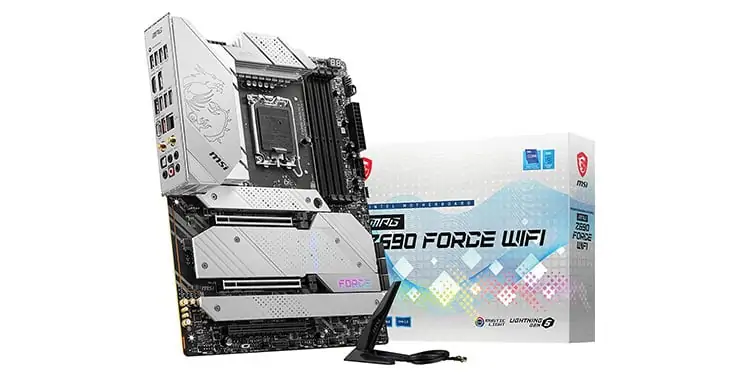
Key Specifications
- CPU Socket: LGA 1700
- RAM Capacity: 128GB DDR5 (4 Slots up to 6666MHz)
- Networking and Connectivity: Intel WiFi 6E and 2.5GBPS Ethernet Port,Bluetooth 5.2
- RGB Support: Yes (MSI Mystic Light)
- Audio: Realtek ALC4080
- Form Factor: ATX (12 x 9.6 inches)
If you love the ASUS ROG Strix Z690-F and are looking for the latest-generation Z690 motherboard, but want one with white and silver accents, the MSI Z690 Force is a great option. It is a bit mediocre in certain aspects, but a great Z690 motherboard all in all.
One of the main features of the MSI Z690 Force is the premium build quality. You can immediately notice the extended heatsink design as well as the aluminum Frozr shields for the four M.2 drives. This not only makes it more durable, but for users who push their PCs to the extreme and run them non-stop, it can keep everything running cool too.
It also has four DIMM slots and a maximum capacity of 128GB of DDR5 memory. For the rear I/O panel, it has pretty much everything you might need: a BIOS button, HDMI and DP ports, regular LAN and Wi-Fi buttons, and many USB 2.0 ports.
In addition to all this, it even has a Q-Code Debug LED for easy troubleshooting. If you’re unaware of this feature, it basically displays a code every time there’s an error. You can look up the corresponding code in the motherboard manual provided in the box and find ways to fix it. It might not be a big deal for PC veterans, but it’s certainly useful for beginners.
So, all of this considered, the MSI Z690 Force is an awesome choice when you consider the price point. If you have an Alder Lake CPU and want a motherboard that’ll run it optimally without any hiccups, definitely give this one a try!
- Q-Code Debug LED can be handy for quick troubleshooting
- DDR5 memory can be overclocked up to 5600MHz
- Quick storage transfer with four M.2 NVMe ports
- Lacks Bluetooth connectivity in older Windows
Gigabyte Z690 Aorus Master – Best ATX Z690 Motherboard for Tweaking
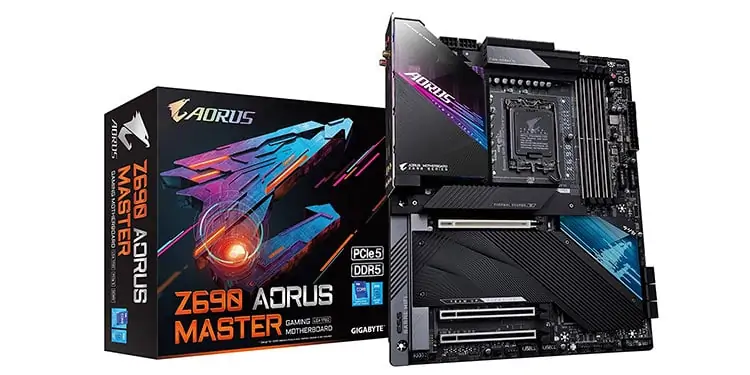
Key Specifications
- CPU Socket: LGA 1700
- RAM Capacity: 128GB DDR5 (4 Slots up to 6400MHz)
- Networking and Connectivity: Intel WiFi 6E, 10G Ethernet Port, and Bluetooth 5.2
- RGB Support: Yes (Aorus RGB Fusion 2.0)
- Audio: Realtek ALC1220-VB
- Form Factor: ATX (12 x 9.6 inches)
If you want a best-of-the-best Z690 motherboard that has all the features you could possibly ask for, like DDR5 compatibility, 10G ethernet, and multiple M.2 drives, then the Gigabyte Z690 Aorus Master is the way to go.
With its absolutely monstrous 19+1+2 phase VRM design, it can make any 12th-Gen CPU reach its limits. To cool off all the heat generated from that power, it has an extended heatsink with thick fins to dissipate the hot air inside the case along with a direct-touch heatpipe and a nanocarbon baseplate.
It’s nothing to scoff at when it comes to the I/O either. It consists of over eleven USB ports, which includes two USB-C variants, by the way. Needless to say, most users will struggle to fill that fully.
Like almost all of the motherboards on this list, the Gigabyte Z690 Aorus Master has pre-installed RGB software, known as Aorus RGB Fusion 2.0, which is highly advanced and provides over 16.8 million colors. Once connected to it, you can control any compatible RGB peripherals and components in your setup like your PC case, fans, and even keyboard.
Of course, there’s also the 10G ethernet port to look forward to, in addition to the WiFi 6E and Bluetooth 5.2. Unfortunately, Internet speeds currently just aren’t fast enough to fully take advantage of a feature like this. Currently, it’s more practical for users with network-attached storage systems.
To round off, if you’re willing to pay the price for it, the Gigabyte Z690 Aorus Master is a total beast of Z690 motherboards. It won’t make your PC run faster, but will definitely provide you with the platform to install and run powerful next-gen components without breaking a sweat!
- Effective cooling system with heatsinks and thermal pads
- 10G Ethernet port great for lag-free gaming and fast downloads
- Immersive audio codec
- Might be out of budget for most users
ASUS Prime Z590-P – Best Budget ATX Motherboard
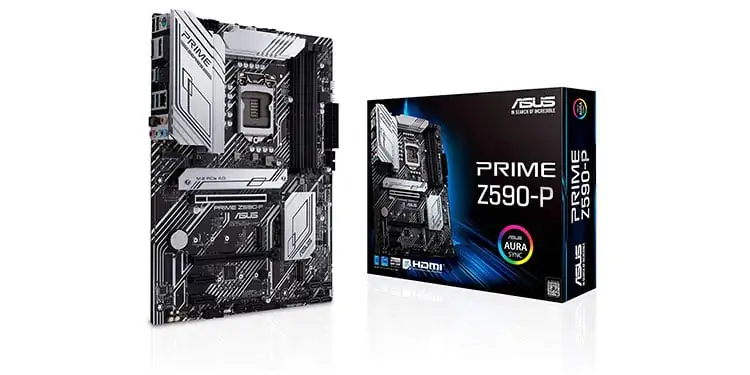
Key Specifications
- CPU Socket: LGA 1200
- RAM Capacity: 128GB DDR4 (4 Slots up to 5133MHz)
- Networking and Connectivity: 2.5G Ethernet Port
- RGB Support: Yes (ASUS Aura Sync)
- Audio: Realtek ALC897 7.1 Surround Sound
- Form Factor: ATX (12 x 9.6 inches)
While Z690 is the new kid on the block, if you’re still using a 10th or 11th Gen Intel CPU, then a Z590 motherboard is a good option for you. These are priced comparatively less, but provide all the necessary features you need to take the most juice out of your CPU and get A+ performance.
The ASUS Prime Z590-P embodies that description perfectly. With a price tag of around $150, it provides some great features in terms of hefty VRMs, quick storage, and great cooling capacity.
It has 10+1 DrMOS VRM phases along with alloy chokes and durable capacitors. While this isn’t good for a Z690, for a Z590 it’s more than sufficient. For a general user, this means a more stable system; for an enthusiast overclocker, it means crazier voltages.
To keep the motherboard from overheating, there’s a VRM and PCH heatsink. If you want to add in some extra cooling power, you can do with the multiple hybrid fan headers and the Fan Xpert 4 utility.
For I/O, it has six total ports in the rear and nine in the front, and there’s also USB-C compatibility. This is great for those who work with high-speed external storage drives, and even those with multiple peripherals will have a hard time using up all of the ports.
Everything considered, if you’re looking for an optimal motherboard for your 10th or 11th-Gen CPU, the ASUS Prime Z590-P should be taken seriously. If you can overlook the lack of WiFi and Bluetooth connectivity, it offers many of the most important features at a reasonable price.
- Provides great value for the price
- ASUS OptiMem II software allows you to overclock your memory with lower voltages for better performance
- Plenty of ports and slots for your devices and peripherals
- Lacks Bluetooth and WiFi connectivity
TUF Gaming Z590-Plus WiFi – Best ATX Motherboard for Stealth Build
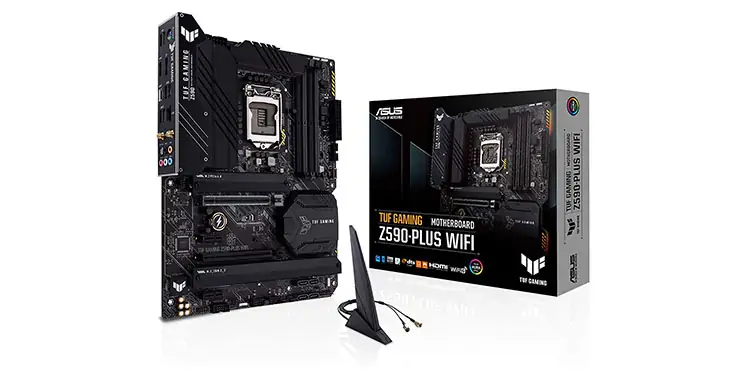
Key Specifications
- CPU Socket: LGA 1200
- RAM Capacity: 128GB DDR4 (4 Slots up to 5333MHz)
- Networking and Connectivity: Intel WiFi 6, 2.5G Ethernet Port, and Bluetooth 5.2
- RGB Support: Yes (ASUS Aura Sync)
- Audio: Realtek S1200A
- Form Factor: ATX (12 x 9.6 inches)
While the ASUS Prime Z590-P is a fine motherboard, I understand that those white accents on the heatsinks and M.2 shield aren’t for everybody. In case you want something more blacked-out but with comparable features, the TUF Gaming Z590-Plus WiFi is a good choice.
As expected, it comes with the LGA 1200 socket which allows you to run your 10th and 11th-Gen Intel CPU on it. To guarantee smooth performance, it has a 14+2 DrMOS power stage design, along with VRM and PCH heatsinks.
If you’re into FPS games, where lagging can mean the difference between winning and losing, you’ll be grateful for the Intel 2.5G LAN port with TUF LANGuard and TurboLAN technology. Thanks to the Realtek S1200A codec, you also get high-quality and crisp audio with a level of immersiveness that makes you feel like you’re standing on the battlefield yourself!
In addition to that, you get triple M.2 NVMe SSD ports which can further improve your gaming experience and eliminate any stuttering issues. This also provides some extra storage space, which definitely comes in handy too.
The TUF Gaming Z590-Plus WiFi is the right pick for those seeking a good Z590 motherboard without RGB or any colorful accents. With heavy-duty VRMs and solid heatsinks, it guarantees smooth performance for your 10th or 11th-Gen Intel CPU leading to a great user experience.
- High-speed storage thanks to M.2 NVMe SSD and USB-C header
- Hefty 14+2 VRM phases
- Durable build quality
- Slightly overpriced
Choosing Compatible Cases
Now, let’s talk about choosing compatible cases for your ATX motherboard.
Mid Tower
Mid Tower cases, as their name implies, are smaller than standard Full Tower ATX cases. This is useful if you want all the PCI Express lanes and utility of a standard ATX motherboard, but don’t intend on running a 4+ HDD RAID setup or custom loop liquid cooling setup.
These effectively function as a compromise between maximum expansion and size. If you want help picking out one for yourself, click one of the two article links we’ve embedded above.
Full Tower
Full Tower cases are the standard for ATX motherboards, and arguably the best fit. These will allow you to make the most usage of your motherboard, and many also offer compatibility with Extended ATX motherboards. In either case, you’ll find much more room for hard drive bays, disk drives, and custom loop liquid cooling setups than before.
If you don’t plan on running large RAID or custom loop cooling setups, however, we don’t recommend a Full Tower case. You’ll likely be better suited for Mid Tower, since Full Tower cases are notoriously large and heavy.
Other (ATX HTPC, etc)
Unfortunately, you usually aren’t going to find anything smaller than ATX Mid Tower. You might luck out and find something like an HTPC case built for full ATX motherboards, but these are very few and far between.
If what you want is a smaller build, we recommend checking out our SFF-centric articles. These include write-ups on Micro ATX cases and HTPC cases.
Can I fit an ATX motherboard in a smaller case?
Even if you do manage to get it to work, chances are you’ll have clearance issues with things like extra drives and PCI expansion. In general, we recommend using ATX motherboards only with compatible ATX cases.
Is an ATX Motherboard a Good Choice for a Gaming PC Build?
The fact of the matter is, motherboards don’t contribute directly to your PC’s overall performance. Instead, they provide a wide platform where you can install and connect all other components to the brain of the PC, the CPU. So, there’s not really a “bad” motherboard for gaming: at the end of the day, it’s all about compatibility.
ATX motherboards generally have all the features most users need, like M.2 slots, in-built WiFi, and dual-channel memory. To install one, you need a compatible PC case, like a full-tower or mid-tower case with the proper mounting points. Anything smaller, like a Mini-ITX, and it won’t fit.
So, yes, as long as you buy an ATX motherboard that provides you the features you need and is compatible with your case, you’re good to go!
Are ATX motherboards better?
If you plan on running multi-GPU setups, multi-drive setups, or custom loop liquid cooling setups…yes. Just make sure that if you’re doing multi-drive or custom loop setups that you opt for a Full Tower ATX case.
Are ATX motherboards easier to build with?.
On Micro ATX boards- and Mini ITX boards even moreso- different connectors are closer together. This can lead to more issues with things like CPU cooler clearance, GPU clearance, and more. If you aren’t an experienced builder or don’t have the help of one, you’re best off building with an ATX motherboard.
Found the Perfect Motherboard Yet?
The ATX form factor is widely used and popular for an important reason: it fits the requirements of most users, is easy to work with, and is budget-friendly as well. So, it’s perfect for most users, both for gaming and productivity-focused builds.
In this article, I reviewed ten awesome ATX motherboards for both Intel and AMD in a wide range of budgets and use cases. So, I hope you found the perfect motherboard to pair with your CPU!

